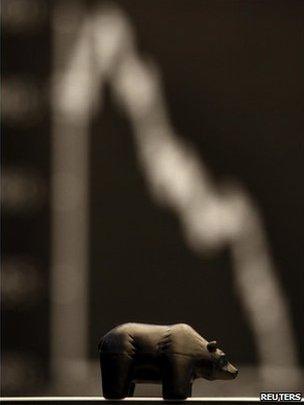Fear and capitulation in European banks
- Published
- comments

There are two semi-rational explanations for the sharp falls in the share prices of French and other European banks.
Societe Generale's shares are down almost 15%, BNP Paribas has fallen 9.5%, Deutsche is 6.6% lower, RBS has fallen 7.3%, Barclays is down 8.7%, Unicredit (of Italy) is 9.4% lower, Credit Agricole has fallen 11.8% and Commerzbank (of Germany) is 8.8% down.
Strong bankers would weep.
Here are those semi-rational explanations.
First, that the economic recovery in the eurozone has run out of steam - which will lead to big falls in bank profits, especially if borrowers have greater difficulties repaying their debts.
Second, that the ratings agencies could strip France of its AAA rating, in the way that one of them, Standards & Poors, has already done for the US - which could lead to sharp falls in the price of French government bonds, and force big losses on the banks that hold those bonds.
A loss of France's AAA rating could also lead to a downgrading of the debt of French banks, making it more expensive for them to borrow.
But the problem with at least one of those semi-rational explanations is that all three ratings agencies have today said they're not going to downgrade France from AAA, and also that the price of French government bonds has actually risen today, which would be a good thing for French banks.
So the more probable reason for the rout in European banks, which has depressed European stock markets and led to contagion on Wall Street, is simply those very basic emotions that afflict investors from time to time (especially recently): fear and capitulation.
Investors see the European Central Bank half-heartedly buying Italian and Spanish government debt, to prevent borrowing costs for those two countries rising to dangerous levels. And they don't see those central bank purchases as a permanent solution.
A more durable solution, perhaps, would be for the eurozone to issue new bonds backed by all member countries - so called euro bonds - to finance loans to financially stretched member states and to strengthen European banks with injections of capital.
But there's a fear that the scale of the fund raising that would be required to shore up Spain, Italy, Greece, Portugal and Ireland - and their respective banks - would foist excessive liabilities on countries like France, which mean it would in the end lose its AAA rating - and that would lead to losses and funding difficulties for French banks.
So if hedge funds are having sport short-selling French and European banks, as I am told they are, we shouldn't perhaps be too surprised.